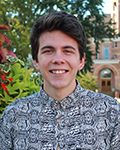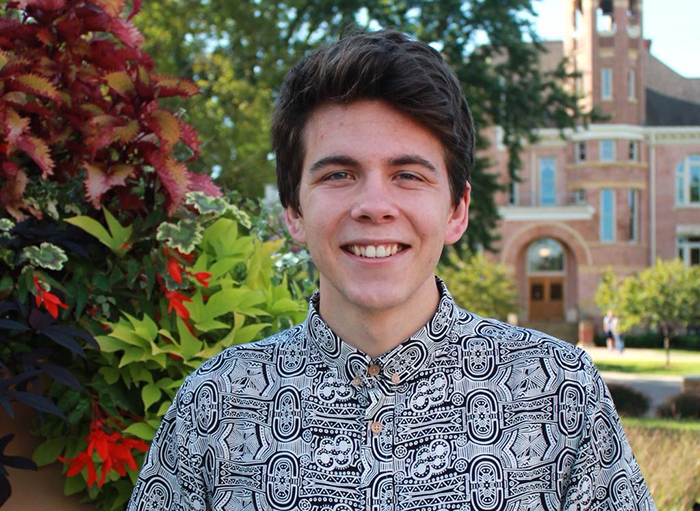We’re taking time over the following weeks to get to know the members of the GSA’s Early Career Scientist Committees. Join us every week to learn more about our early career scientist advocates.

Joseph Tolsma
Communication & Outreach Subcommittee
North Carolina State University
Research Interest
DES is a synthetic form of estrogen that was prescribed to women from the 1940s through 1971, and it has been linked to increased risks of various cancers and pregnancy complications. Though DES is no longer prescribed to pregnant women, I’m interested in understanding the genetic factors that influence health outcomes after estrogen exposure because it can occur through a variety of environmental and medical sources. Ultimately, we want to understand why some individuals are more sensitive or resistant to estrogen exposure than others. Using DES as a model should allow us identify genetic markers associated with health outcomes from exposure to a variety of different estrogens. My lab has identified two mouse strains that are, in turn, susceptible or resistant to DES exposure, and we have analyzed mRNA expression of these two strains. We will be using these two strains and both forward and reverse genetics approaches to better understand the genetic underpinnings of the resistance/susceptibility traits.
As a PhD-trained scientist, you have many career options. What career paths interest you the most, and why?
I want to remain in a research-oriented position. Excellent research has always inspired me to become a better scientist when analyzing data or working at the bench. As a researcher, I work to bring an effective style of presentation when sharing my work. I think that research is best presented as a story rather than a data dump or lecture. In practice, translating data into a meaningful story allows the listener to synthesize the key points more easily. I hope that using this style of data presentation in an academic position would foster a more collaborative community of scientists and more open sharing of data.
A big factor driving my career interest is the recent report out of Berkeley that almost half of PhD students have feelings of depression, and 10% have contemplated suicide. Unfortunately, I don’t see enough being done at a broad institutional level to address this problem, this places much of the responsibility on departments, programs, and individual labs. In the future, I hope to be in a position that allows me to create an atmosphere that addresses these problems. I think the scientific community can make changes by encouraging balanced work/life habits, clear communication, and a sense of community. Graduate school is a stressful experience, and it’s often accompanied by major life decisions. In my future career, I want to mentor students in a way that helps them become well-rounded people. I believe that fostering growth is just as important as producing great science.
In addition to your research, how else do you want to advance the scientific enterprise?
I started in science because a professor, who later became my undergraduate advisor, let me come with her to collect mayfly nymphs during her summer research. I was pretty young, but she clearly showed me what they were looking for in the streams while characterizing banks and stream bottoms. Many current graduate students point back to similar interactions as “the moment,” and it’s telling that many people can point to moments like those.
I want to inspire kids to fall in love with research as I have. They don’t have to become geneticists or even scientists—I just hope they develop an appreciation for research and an understanding of the scientific process. It is certainly important for the public to understand the merits of scientific funding and how that funding is used, but beyond that, it’s important for everyone to understand how scientists arrive at a conclusion.
It’s refreshing and inspiring for me to interact with young people and get them excited about the things scientists care about. I try to achieve this is through small restoration ecology projects. It’s an excellent way to teach basic scientific principles and rally a community around tangible improvements to a shared resource.
As a leader within the Genetics Society of America, what do you hope to accomplish?
Genetics is something most everyone is aware of, but language makes understanding research difficult. Questions like “is it genetic?” and terms like “variation” are often used by the general population but have little defined meaning for researchers. This contributes to misunderstanding and frustrations when the public tries to interpret scientific findings. I’d like to help simplify the way we communicate while keeping the core findings intact. It’s an important skill to translate your work into a clear message without also making it easy to misinterpret.
I’d love to work on a series of posts using visual tools to help people grasp genetics concepts—from alleles to bottlenecks. If the information is presented effectively, it’s possible for people to gain a better understanding of what it means for something to be “genetic” or to have “variation.” Experts need a deep understanding of genetics, but for non-experts, simple demonstrations and a few vials of Drosophila are fun ways to teach people the basics. Long term, I hope to help the public understand why it’s important to fund research from frog embryos to sea urchin larvae.
Previous Leadership Experience
- Young Evangelicals for Climate Action, Fellow—Northwestern College
- Junior Scholar/Teacher’s Assistant—Northwestern College
- Peer Tutor—Northwestern College
Contact













